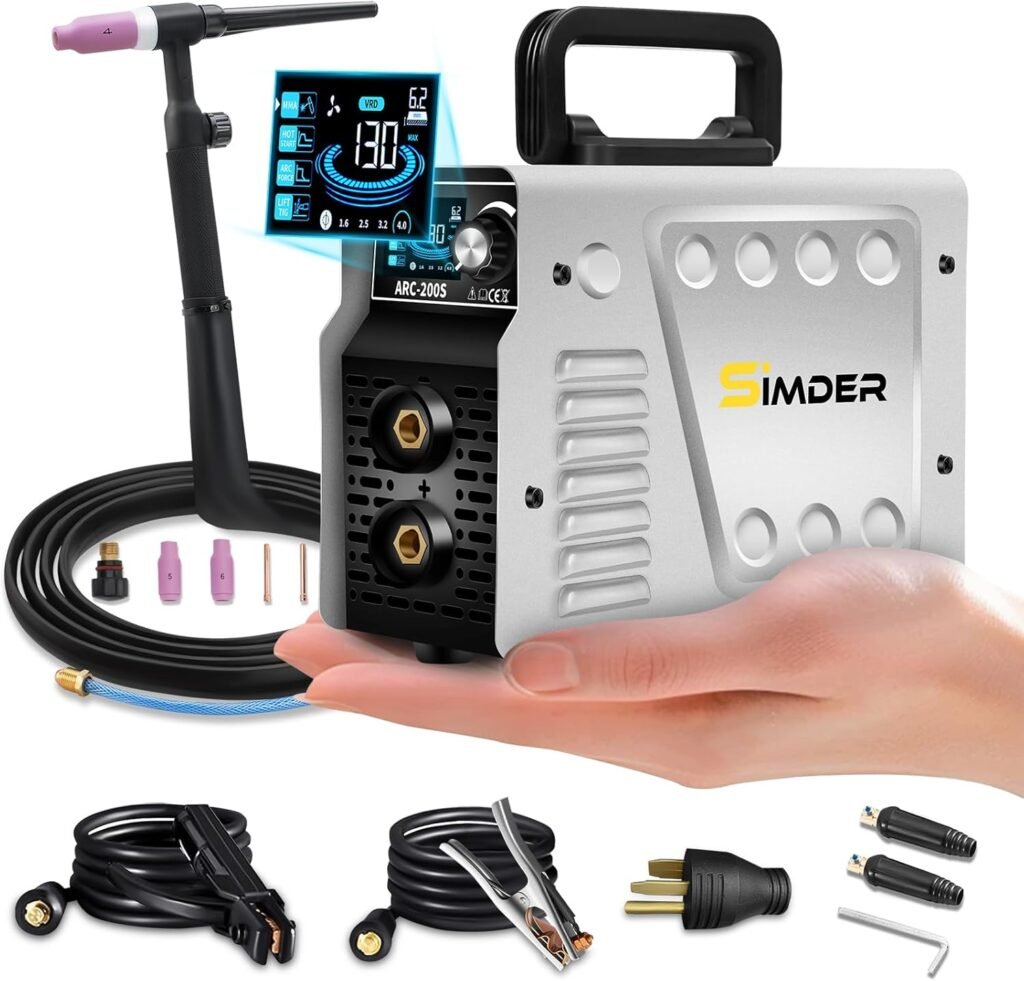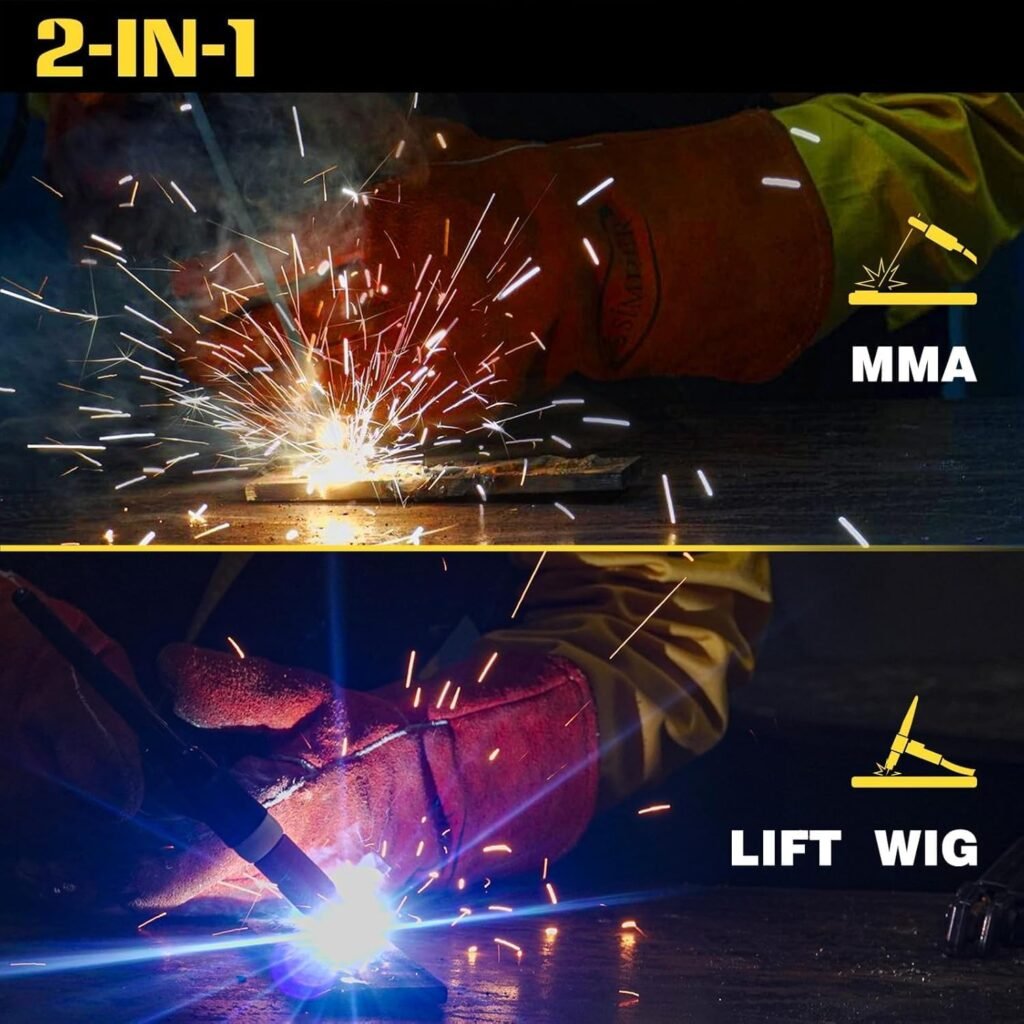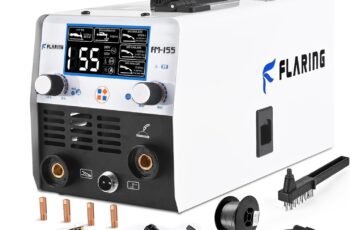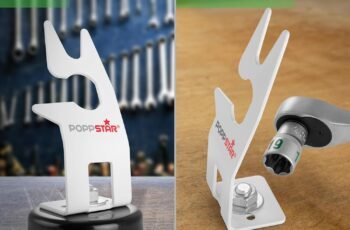Ad Blocker Detected
Our website is made possible by displaying online advertisements to our visitors. Please consider supporting us by disabling your ad blocker.
Are you looking for a compact, versatile welder that handles both stick and TIG tasks without hogging your workshop space?
Product at a glance: SSIMDER Stick/Lift TIG 2-in-1 Portable Welder Dual Voltage Welder 110V/220V | IGBT Inverter Tech & Hot Start/Anti-Stick | Home DIY, Metal Fabrication | Garage/Worksite Use | with the WP17 TIG torch
You want a quick snapshot before getting into the details, and this section gives you exactly that. Below is a concise technical breakdown so you can compare specs and features at a glance.
| Feature | Specification / Notes |
|---|---|
| Product Name | SSIMDER Stick/Lift TIG 2-in-1 Portable Welder Dual Voltage Welder 110V/220V (ARC-200S) with WP17 TIG torch |
| Welding Modes | MMA (Stick), Lift TIG |
| Output Current | Up to ~130A (mini portable range) |
| Input Voltage | Dual voltage: 110V / 220V |
| Duty Cycle | Typical for small inverter units (check manual for exact % at rated current) |
| Technology | IGBT inverter |
| Display & Controls | Smart LCD digital display with knob for adjustments |
| Key Features | Hot Start, Arc Force (Anti-Stick), Lift TIG, Over-current/over-voltage/overheat protection |
| Weight & Size | ~5 lbs; ~9 x 4 x 7 inches |
| Torch | WP17 TIG torch included (lift TIG capable) |
| Rod Compatibility (Stick) | Good performance on 6010, 6011, 6013, 7018 |
| Materials | Metal sheets, cast iron, carbon steel, mild steel, square tubing, stainless steel |
| Cooling & Protection | Cooling fan motor, dust prevention; comprehensive safety protections |
| Warranty | 1-year factory-tested warranty from SSIMDER |
| Ideal Use | Home DIY, garage repairs, automotive work, farm/roadside repairs, crafts, lightweight metal fabrication |
Quick summary you can rely on
You’re holding a small, remarkably portable welding package that aims to give you both basic stick welding and lift TIG functionality. It’s designed for hobbyists and light fab work, and it brings features (IGBT inverter, hot start, arc force) that make starting and running easier for less experienced users.
Why dual-mode matters for you
Having both stick and lift TIG in one unit means you don’t need separate boxes for common small jobs around the shop or farm. You can use stick welding for rough outdoor repairs and switch to lift TIG for cleaner joints where appearance and precision matter.
Design and build quality
You’ll notice the ARC-200S’s compact footprint immediately, which makes it easy to transport and store when you’re not using it. The build favors portability: the casing, handle, and shoulder strap are made to keep weight down while still offering reasonable ruggedness for light workshop use.
Chassis and layout
The front panel keeps controls simple: a knob for selecting current and functions plus a clear LCD readout for real-time settings. Your connections (electrode holder, ground clamp, and TIG torch) attach in typical positions so hookups remain intuitive whether you’ve used a welder before or are just getting started.
Controls and the Smart LCD display
You’ll appreciate the smart LCD display because it removes much of the guesswork when setting amperage and electrode size. The knob control is tactile and makes fine adjustments reasonably easy compared to menus.
Modes shown and adjusted on-screen
The display shows current and electrode size information clearly, and the interface walks you through MMA and TIG modes without burying settings. This helps you set up faster and reduce wasted material from trial-and-error adjustments.
Core electronics: IGBT inverter tech
IGBT inverter technology gives you more efficient power conversion and a more stable arc than older transformer-style welders. For you, that translates to less weight, better energy efficiency, and generally smoother arc behavior in thin-to-moderate gauge work.
Benefits you’ll notice in daily use
Expect quicker arc response and a compact package that doesn’t compromise basic arc control. The inverter also helps keep the machine cooler and lighter, which is a real advantage if you move the unit between work areas often.
Stick welding performance (MMA)
You can depend on the ARC-200S to handle common stick rods like 6010, 6011, 6013, and 7018, which covers most small repair and maintenance needs. The hot start and arc force functions make initiating and maintaining the arc easier, particularly when you’re working with weather-affected electrodes or rusty stock.
How hot start and arc force help you
Hot start gives a short surge of current to get the electrode burning away from the workpiece without excessive sticking, while arc force keeps the arc stable under variable conditions so you don’t have to babysit it. Together these features reduce frustration and wasted electrodes, especially when you’re learning or working outdoors.
Lift TIG performance and the included WP17 torch
Lift TIG gives you TIG-style welds without needing high-frequency start equipment, and the WP17 torch included with the unit is a standard, reliable choice for light TIG work. Lift TIG is great for you when you need cleaner, lower-spatter welds on thin materials or stainless where appearance and penetration control matter.
Practical TIG tips for better results
When using lift TIG, you’ll need to practice the start motion (touch, lift, then weld) until it becomes natural — the LCD makes it easier to set the right current. Use a clean joint, appropriate filler rod, and controlled travel speed to get the best-looking welds with this portable setup.
Portability and setup
At roughly 5 pounds and a compact 9 x 4 x 7 inch footprint, this is one of the easiest welders to carry with you. The included handle and optional shoulder strap mean you can move between job sites and tuck it away in a small truck compartment or a crowded garage.
Power options and working in different locations
Dual voltage lets you run on household 110V outlets or a 220V supply for higher output. That flexibility means you can do light projects at home and crank up the power for thicker sections when you have access to 220V — a very handy capability for mobile work.
Safety protections you should know about
The welder integrates over-current, over-voltage, and overheat protections so the unit will shut itself down or limit operation in unsafe conditions. This reduces the chance of damage and makes it safer for you to use without constant monitoring.
Cooling and longevity
An efficient fan motor helps cool the electronics and prevent dust build-up, which increases service life. Even so, you should still operate in a clean environment and avoid grinding or heavy dust near the vents to keep performance consistent.
What you can weld with it
You can efficiently weld metal sheets, cast iron, carbon steel, mild steel, square tubing, and stainless steel depending on the mode and technique. This covers the majority of home DIY tasks, auto repair patches, and light farm equipment fixes you’re likely to encounter.
Match materials to the right mode
Use stick (MMA) for thicker, dirty, or outdoor jobs where speed and robustness matter; use lift TIG for thin metals or where finish and control are important. The included compatibility with common rods and a TIG torch gives you the flexibility to choose the right tool for each job.
Consumables and electrode guidance
The machine handles popular rods like 6010, 6011, 6013, and 7018 well, and if you use those sizes and types you’ll find the machine intuitive to manage. For TIG, select appropriate filler rods (ER70S-2 for general steel, ER308 for stainless), and keep tungsten tips properly prepared for stable arcs.
Practical consumable tips
You’ll get far better consistency by keeping spare electrodes, filler rods, gas hoses (if converting to gas TIG later), and contact tips on hand. Even though lift TIG doesn’t require high-frequency starts, clean tungsten and clean base metal still matter for quality welds.
Accessories included and setup checklist
You receive the WP17 TIG torch and the basic stick accessories like an electrode holder and ground clamp, along with connection leads. The unit typically ships factory-tested with a 1-year warranty, and you should test connections and polarity before starting your first weld.
Quick setup steps to get welding
Inspect all cables, attach the ground clamp to clean metal, set the mode (MMA or TIG), select the approximate current on the LCD, and test on scrap to dial in technique. Remember to use proper PPE: helmet, gloves, jacket, and ventilation.
User experience: who it’s best for
This unit is ideal for you if you’re a hobbyist, a weekend fabricator, or someone who needs a compact, mobile welder for basic repairs. It suits fathers, husbands, boyfriends, and DIY enthusiasts who want a single tool to handle multiple common welding tasks.
Where it’s not ideal
If your work requires consistent, industrial-duty welds at high duty cycles, or advanced TIG with pedal control and gas shielding for cosmetic stainless work, you’ll want a larger, more specialized TIG or MIG system. For professional fabricators who weld full production days, the duty cycle and output limits of this mini-inverter may feel restrictive.
Pros and cons at a glance
You deserve a succinct list to weigh up the real strengths and trade-offs of the ARC-200S. Below is a short pros/cons table to help you decide quickly.
| Pros | Cons |
|---|---|
| Very lightweight and portable (~5 lbs) | Limited duty cycle vs larger machines |
| Dual voltage (110V/220V) gives flexibility | 130A max limits very thick material welding |
| Supports both Stick and Lift TIG in one unit | Lift TIG lacks high-frequency start and advanced TIG features |
| Smart LCD for easier setup and readouts | Accessories and lead lengths may be minimal for some users |
| Hot Start and Arc Force reduce sticking and spatter | Not a heavy industrial production machine |
| Comprehensive safety protections | Needs a competent user for best TIG results |
Real-world performance and testing notes
When you use the unit on mild steel and stainless panels, it provides a surprisingly smooth arc for its size, especially once you tweak hot start and arc force settings. Stick welding is forgiving on dirty or rusty pieces, while lift TIG yields cleaner beads if you control your technique.
What to expect on common jobs
On a muffler patch, battery tray repair, or farm implement fix, you’ll find the unit capable and responsive. On thicker gate hinges or heavy structural work, you will be better served by a higher amperage machine or stitch welding to avoid prolonged runs that overwhelm the duty cycle.
Maintenance and troubleshooting
You should keep the vents clean, inspect cables for fraying, and ensure tight connections to prevent intermittent arc behavior. If the machine overheats, it will shut down — allow cooling, check ventilation, and avoid long runs at peak current to minimize repeat trips to the thermal limit.
Common troubleshooting tips
If the arc is inconsistent, check electrode condition, ground clamp contact, and cable connections first. For TIG issues, make sure the tungsten is correctly sharpened and that you’re using a clean joint; practice the lift-start motion until you get repeatable starts.
Safety and PPE reminders
Welding creates intense UV radiation, hot spatter, and toxic fumes — always use a proper welding helmet, gloves, flame-resistant clothing, and adequate ventilation when applicable. Never leave the unit powered up unattended, and keep flammable materials away from the work area.
Electrical safety tips
Because the unit supports 110V and 220V, confirm correct input voltage and polarity and use a GFCI or proper breaker especially on 110V circuits. Avoid welding in wet conditions and make sure your ground clamp contacts bare metal to prevent stray current paths.
Warranty and after-sales support
SSIMDER provides a 1-year warranty and states that units are factory-tested before shipping, which means you can expect basic support for defects and initial problems. If you have questions or issues, their customer service is the first stop; keep your purchase details and photos handy to speed up assistance.
What to prepare for support interactions
Document serial numbers, describe the fault clearly, and include photos or short video clips if the issue is intermittent. For consumables or wear items, warranty coverage may differ — check the user manual and warranty terms for exclusions.
Practical tips to get the best results fast
Start by practicing on scrap metal that matches the thickness of your actual project to dial in amperage and technique. Use short runs, check heat input, and match electrode/filler choices to the base metal to avoid weak or brittle welds.
How to improve TIG bead appearance
Keep tungsten clean and properly ground, use steady travel speed, and maintain a consistent arc length. If your TIG bead looks porous or contaminated, check base metal cleanliness and try slightly lower current with slower travel.
Comparison to some alternatives you might consider
If you’re comparing this to a dedicated TIG-only inverter, the dedicated unit will usually offer foot pedal control, gas shielding, and better cosmetic stainless work. Compared to a transformer stick welder, the SSIMDER is far lighter and more efficient but may offer less raw durability under industrial duty cycles.
When to choose a different tool
Choose a dedicated TIG machine if you plan on consistent precision stainless or alloy welding with gas shielding and pedal control. Choose a heavy transformer stick welder or inverter with higher amperage if you routinely weld very thick sections or perform industrial repair work.
Final verdict — is this the right tool for you?
If you’re doing home projects, garage fixes, and occasional light fabrication and you value portability and ease of use, the SSIMDER ARC-200S is a strong choice that balances capability and convenience. It gives you both stick and lift TIG in a compact package with thoughtful features like an LCD, hot start, and arc force that make welding smoother and less stressful.
Buy it if you want versatility and portability
You should buy this unit if you want a lightweight multi-role machine you can take to the jobsite, keep in your garage, or use on the farm for quick repairs. It’s especially good for hobbyists and DIYers who want the option of cleaner TIG-style welds without investing in a full TIG setup.
Consider other options if you need heavy industrial performance
If you need continuous high-amperage output, heavy production duty cycles, or advanced TIG functionality (pulse, pedal, HF start), look at more specialized or more powerful machines. The ARC-200S excels at lightweight, flexible work but is not meant to replace industrial-scale equipment.
Practical buying checklist for you
Before you buy, confirm the voltage you’ll use most, check accessory lengths and types, and read user reviews for real-world experiences with duty cycle and durability. Also verify warranty and local support options so you can get help if something goes wrong.
Final usage tips once you own it
Practice on similar materials, experiment with hot start and arc force settings to find what feels best, and always keep a small toolkit of spare electrodes and consumables nearby. This approach will let you take full advantage of the machine’s strengths while avoiding common beginner pitfalls.
If you want, I can help you compare this SSIMDER ARC-200S with a few specific alternative models in its price range and suggest the best consumables for the tasks you plan to do.
Disclosure: As an Amazon Associate, I earn from qualifying purchases.







